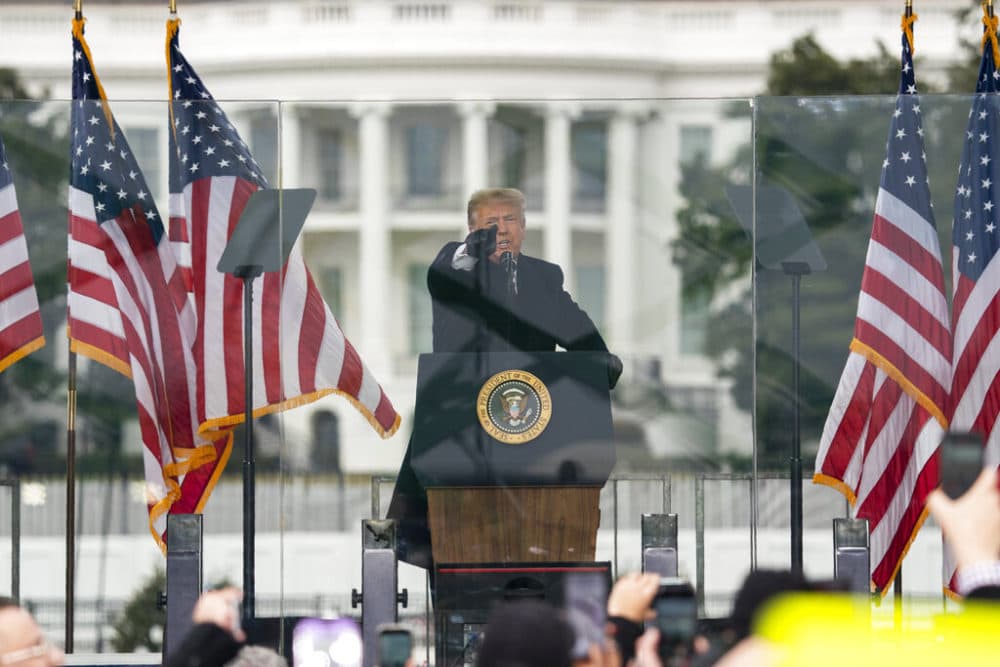Advertisement
Trump's Acquittal: What It Means For The Republican Party
Resume
The Senate voted to acquit former President Donald Trump. We discuss what it means for the Republican Party and the nation.
Guests
Michael Whatley, chair of the North Carolina Republican Party. (@WhatleyNCGOP)
Norman Ornstein, emeritus scholar at the American Enterprise Institute. Contributing editor for The Atlantic. Contributing editor and columnist for the National Journal. (@NormOrnstein)
Jack Beatty, On Point news analyst. (@JackBeattyNPR)
Also Featuring
Rep. Susan Wild, representative for Pennsylvania's 7th Congressional District. (@RepSusanWild)
Interview Highlights
On Trump’s acquittal, and ‘fear’ in the Republican party
Norman Ornstein: “While a majority of Americans were very unhappy with his conduct leading up to the insurgency and the insurrection on January 6th, a majority of Republicans felt differently. And the most active activist Republicans in particular. And I'm not just talking about the rank and file.
"What we're seeing now is state parties condemning in Louisiana, unanimously condemning Senator Bill Cassidy for voting to convict Trump. This is a Republican Party that some years ago refused to do the same thing for David Duke. So it's a very different Republican Party now. And I think we have different groups of Republicans in the Senate with different motives. There are some who are true believers, a few at least.
“And I think Rand Paul may be among them, who really do believe that the election was stolen still, despite the overwhelming evidence to the contrary. And who are with Trump, are all in. There are some who are just scared to death of being shunned and excommunicated and maybe even threatened physically and otherwise if they take on Trump.
"And remember, they're all very much aware of what happened to Brad Raffensperger, the Georgia secretary of state who had death threats against himself and his family. Large numbers of them. There's a fear factor here that's pretty considerable and it's led to a significant amount of cowardice. And then there are those who I think are just more specifically calculating, looking to 2024 and looking for the best way to gain traction, to maybe run as a smarter, younger version of Trump.”
On Trump’s status within the Republican Party
Norman Ornstein: “One thing we know about his power is that deplatforming him from some of the major social media outlets and particularly Twitter, where his message has resonated so enormously and they were picked up on by mainstream media as they were by right-wing media and amplified in many different ways. That resulted in an immediate reaction out there. Taking that away has been somewhat damaging for him.
"Now he's going to find other platforms and he has plenty of allies on some of those platforms, including, of course, on cable television with not just FOX and loyal soldiers like Sean Hannity, but talk radio with Laura Ingram, the OANN network on Newsmax, which has picked up a lot of support. He'll find some social media outlets, Parler may be one of them, but it's tougher for him.
“At the same time, we have to keep in mind that Trump faces enormous challenges now out of office — legal challenges. He's being investigated for criminal conduct in Georgia by the Fulton County prosecutors. As I might note ... Lindsey Graham [is] perhaps his strongest cheerleader in the Senate. As you pointed out at the beginning of the show, when, as chairman of the Senate Judiciary Committee, Graham called and tried to influence the vote count in Georgia.
"But for Trump, he also has major legal challenges in New York from the New York attorney general, from the New York City district attorney over his financial dealings before he became president. And we may well see the southern district of New York, the Justice Department, follow up on what Mitch McConnell, the Senate Republican leader, said as he condemned Trump after voting to acquit him, but said there are criminal charges that could be brought to a former president.
“We know he has financial challenges as well. But I think we can make no mistake about it, the fact that the vast majority of Republican senators, after all of this, voted to acquit — that, after what we learned. One of the most striking things about this.
"Look at the House of Representatives, where we saw this last minute twist in the trial as we got the public expression of the several members of the House about the phone call that Kevin McCarthy, the House Republican leader, had in the middle of the siege while he saw his members threatened and potentially being killed, calling the president and begging for help and having the president say first that it was Antifa. ... When McCarthy said, ‘No, it's your supporters.’ He said, ‘Well, maybe they care more about the election than you do, Kevin.’ Which got an expletive in response.
"But after that, McCarthy and all but 10 of those House Republicans, 200 of them, still voted against the impeachment. So that tells you that even out of office now, Trump has a lot of sway over Republicans. And while we see a couple of polls since the acquittal in the Senate that show support from Republicans has dropped some, a majority still strongly support Trump and believe that the election was rigged. So he's still got power here. And how long that lasts and what happens as it confronts his legal challenges is one of the big unknowns.”
On people leaving the Republican Party
Norman Ornstein: “If people leave the Republican Party, there isn't really a great alternative out there. And here's the bottom line reality. Our political system needs two parties that are problem-solving oriented, respectful of institutions of what we call the regular order. We're going to have very different ideologies. The Republican Party ideology, if it becomes a problem-solving party, is going to be pretty close to what Jeff Flake represents.
"And Ben Sasse, who's a very conservative guy who also voted to acquit. But it's very different if your orientation is to solve problems than if it is to cling to power by suppressing votes and blowing up norms and institutions and not caring about anything that requires compromise. And if we don't have powerful people inside making that case, then we get what we see right now.
"Which is, frankly, the party that is more a cult and to some degree a cult of personality around Trump, but more broadly, a cult. And we know from our surveys as well that Democrats and independents believe that to solve our national problems, we often need to compromise. And Republicans by significant majorities don't. And that's not a good thing to have in a political system. We need a Republican Party that's going to be a conservative party that functions as a conservative party and not in a radical fashion."
From The Reading List
New York Times: "Takeaways From Day 5 of Trump’s Impeachment Trial" — "The conclusion of Donald J. Trump’s impeachment trial was briefly cast into doubt on Saturday after a last-minute request for witness testimony threatened to extend a proceeding on whether the president had incited the Jan. 6 Capitol riot that had been on the verge of wrapping up."
USA Today: "McConnell says Trump's 'crescendo of conspiracy theories' caused Capitol riot but votes to acquit" — "Senate Minority Leader Mitch McConnell said former President Donald Trump's 'crescendo of conspiracy theories' caused the Jan. 6 Capitol insurrection but said he voted to acquit the 45th president because the Constitution does not permit the Senate to punish someone no longer in office."
New York Times: "‘There’s Nothing Left’: Why Thousands of Republicans Are Leaving the Party" — "In the days after the Jan. 6 attack on the Capitol, the phone lines and websites of local election officials across the country were jumping: Tens of thousands of Republicans were calling or logging on to switch their party affiliations."
The Atlantic: "I’ve Witnessed the Decline of the Republican Party" — "I have been immersed in national politics in Washington for five decades. Over my time here, as an academic, a congressional staffer, a think tanker, and a commentator and public figure, I have gotten to know and worked with a wide range of key actors in politics and policy."
This program aired on February 15, 2021.

